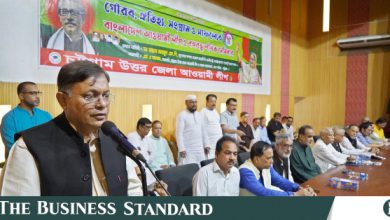Deadlock over fertiliser imports persists owing to dollar crunch


Stock of urea can meet demand till September and non-urea fertilisers till October
Infograph: TBS
“>
Infograph: TBS
The interim government faces a challenge in ensuring fertiliser imports as banks are reluctant to open letters of credit (LCs) amid the ongoing dollar crisis.
The deadlock, inherited from the ousted Sheikh Hasina government, has worsened, with private sector participation in fertiliser tenders lacking and foreign suppliers hesitant due to outstanding unpaid bills from Bangladesh.
The agriculture ministry expressed this concern in a letter sent to the Cabinet Division on 13 August, requesting urgent assistance in the import of fertilisers.
“If the import of fertilisers is not started on an urgent basis, there may be a multi-dimensional crisis, including a fertiliser shortage in the country from next October,” reads the letter.
The ministry noted that the current stock of urea fertiliser can meet demand until September, while the stock of non-urea fertilisers can last until October.
It was also noted that 40 lakh tonnes of fertiliser will be required to meet demand for the Rabi season starting in October. It takes 90-120 days for fertilisers to reach Bangladeshi ports after LC opening.
According to officials, the Bangladesh Chemical Industries Corporation (BCIC) and the Bangladesh Agricultural Development Corporation (BADC) have failed to open LCs with banks.
Additionally, private importers are facing similar problems, as foreign banks are refusing to provide LC confirmations due to concerns about instability in the local banking sector and the current situation in the country.
In this context, the agriculture ministry has urgently sought government assistance.
Due to the prolonged student movement, the Cabinet Committee on Government Procurement did not convene during the final days of the Hasina government.
Since her ouster, the procurement committee has yet to be formed under the interim government. As a result, BCIC is unable to proceed with approving urea imports or opening LCs.
The Cabinet Division yesterday wrote to the Finance Ministry, urging swift action to remove obstacles in fertiliser imports to ensure stable agricultural production.
“Maintaining a consistent fertiliser supply is crucial to preventing disruptions in agricultural output,” it added.
Usually, state-owned banks open LCs for fertiliser imports, covering the costs and paying foreign suppliers from their own funds. After the fertilisers are imported, BCIC and BADC settle their dues with the banks upon receiving subsidy payments from the government.
However, due to a financial crunch, public sector banks such as Sonali, Janata, Agrani, and Krishi have been unable to open LCs for fertiliser imports for several months because the government delayed fertiliser subsidy payments.
At a meeting chaired by Chief Adviser of the interim government Professor Muhammad Yunus on August 12, emphasis was placed on maintaining a stable supply of fertilisers.
Finance Adviser Salehuddin Ahmed told The Business Standard that necessary instructions have been issued to ensure that the dollar crisis does not affect the import of essential commodities, including fertiliser and fuel.
BCIC is responsible for ensuring the supply of urea fertiliser according to demand. However, it informed the government last month that banks are not opening LCs for their urea imports.
BCIC Chairman Md Saidur Rahman told TBS yesterday, “We have signed an agreement with Qatar to import urea. Agreements with Saudi Arabia and the United Arab Emirates will be finalised this month. We need to import 17 lakh tonnes of urea from these three countries as well as from Karnafuli Fertiliser Company (Kafco).”
He added, “Once the Cabinet Committee is formed, we will approach banks to open LCs for importing urea. Hopefully, considering the country’s food security, the interim government will prioritise the urgent import of fertilisers.”
Saidur Rahman also noted that currently two urea factories are operational in the country, allowing for a production capacity of 10 lakh tonnes.
What did the Agriculture Ministry tell Cabinet Division?
The Agriculture Ministry has informed the Cabinet Division that Sonali Bank has not been opening LCs for fertiliser imports since June due to the foreign exchange crisis.
“Due to Sonali Bank’s failure, BADC, following a suggestion from the Bangladesh Bank, proposed opening an LC with Islami Bank. However, Islami Bank declined to accept the proposal without a 100% margin,” the ministry stated.
“As BADC lacks its own funds, it is not feasible to import fertilisers with a 100% margin. Consequently, there has been a deadlock in fertiliser imports since June.”
The ministry also noted that, as of May, BADC’s outstanding bill for imported fertilisers totals $160 million. Foreign suppliers have been expressing their inability to supply fertilisers to Bangladesh and are pressing for payment through their respective embassies.
BADC imported 9.5 lakh tonnes of fertilisers through the private sector this year to meet the demand for TSP, DAP, and MOP fertilisers.
In a letter sent to the relevant ministries as well as the Prime Minister’s Office last month, BCIC said banks were unwilling to open LCs for importing urea.
The letter mentioned that BCIC on 4 July sent a proposal to Sonali Bank on opening an LC to import fertiliser from Fertiglobe of the UAE. However, on 7 July, the bank sent back the proposal, saying it was not possible to open the LC due to the dollar crisis.
“It is critical to start urea imports now. However, banks are refusing to accept our LCs. Sonali Bank has notified us of its inability to proceed,” the BCIC chairman told TBS.
Mentioning that there is sufficient fertiliser stock for the current Aman season, he said, “Our concern lies in ensuring an adequate supply during the peak Boro season. If the government can provide gas to the closed factories as an interim solution, we can ease the crisis.”
Earlier on 16 April, BCIC submitted a proposal to Agrani Bank on opening an LC for importing urea from Kafco. But the bank promptly returned the proposal without opening the LC.
Kafco, a multinational joint venture based in Chattogram, requires the government to open an LC as per their contract for urea purchase.
Subsequently, BCIC forwarded the proposal to Krishi Bank on 21 April. The bank took 53 days to process the request.
Later, on 29 May, BCIC submitted another LC proposal to Agrani Bank for a subsequent batch of fertiliser imports from Kafco. Agrani Bank processed and established the LC after 32 days.




